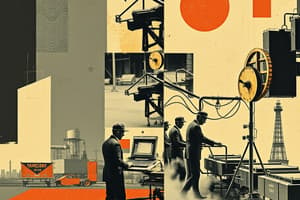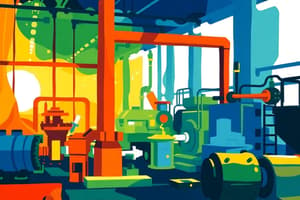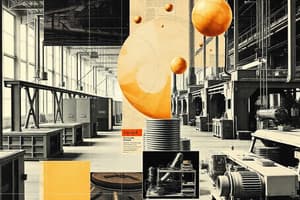Podcast
Questions and Answers
Which activity is not considered a part of the series of productive activities recognized in manufacturing?
Which activity is not considered a part of the series of productive activities recognized in manufacturing?
- Marketing
- Production
- Procurement
- Archiving (correct)
In the context of manufacturing, which activity directly follows procurement?
In the context of manufacturing, which activity directly follows procurement?
- Design
- Quality Control
- Planning
- Inventory (correct)
Which activity is primarily focused on ensuring the right product reaches the consumer?
Which activity is primarily focused on ensuring the right product reaches the consumer?
- Production
- Marketing
- Distribution (correct)
- Sales
Which of the following activities is essential for the decision-making process in manufacturing?
Which of the following activities is essential for the decision-making process in manufacturing?
Which sequence accurately depicts a typical order of manufacturing activities?
Which sequence accurately depicts a typical order of manufacturing activities?
Which of the following activities is considered part of the production process?
Which of the following activities is considered part of the production process?
What is NOT a component of the production process in construction?
What is NOT a component of the production process in construction?
Which activity would be categorized under the actual construction phase?
Which activity would be categorized under the actual construction phase?
Securing financing is crucial for which aspect of the production process?
Securing financing is crucial for which aspect of the production process?
Which option does NOT relate to the initial phases of production?
Which option does NOT relate to the initial phases of production?
Flashcards
What is the first step in "Manufacturing"?
What is the first step in "Manufacturing"?
The planning stage sets the groundwork for the entire manufacturing process.
What does "Design" entail in "Manufacturing"?
What does "Design" entail in "Manufacturing"?
Design lays out the specifications and blueprints for products, determining their features and functionality.
What does "Procurement" mean in "Manufacturing"?
What does "Procurement" mean in "Manufacturing"?
Procurement involves securing the necessary materials and resources to produce the goods.
What is "Production" in "Manufacturing"?
What is "Production" in "Manufacturing"?
Signup and view all the flashcards
What role does "Management" play in "Manufacturing"?
What role does "Management" play in "Manufacturing"?
Signup and view all the flashcards
Finding Land
Finding Land
Signup and view all the flashcards
Securing Financing
Securing Financing
Signup and view all the flashcards
Hiring Architects
Hiring Architects
Signup and view all the flashcards
Hiring Builders
Hiring Builders
Signup and view all the flashcards
Acquiring Building Materials
Acquiring Building Materials
Signup and view all the flashcards
Study Notes
Manufacturing Introduction
- Manufacturing is a series of productive activities, including planning, design, procurement, production, inventory, marketing, distribution, sales, and management.
- Manufacturing management links design to the manufacturing system.
- A factory or workshop executes manufacturing.
- Manufacturing firms (or manufacturers) are firms focused on manufacturing.
- Manufacturing is the creation of a tangible product from raw materials.
Manufacturing vs Production
- Production is a broader concept encompassing the entire process of creating something, including resources, planning, and final output (goods and/or services).
- Manufacturing is a narrower aspect of production, focusing specifically on transforming raw materials into tangible products using tools, machinery, and labor.
Importance of Manufacturing
- Manufacturing provides the fundamental means of human existence in modern societies, as survival depends on goods production.
- Manufacturing creates wealth for nations; manufacturing activities drive economic growth and prosperity within a country or nation.
- Manufacturing improves people’s quality of life by making essential products and services more accessible and affordable.
Manufacturing and Economy
- Manufacturing creates jobs and income for a substantial portion of the workforce.
- Manufacturing contributes significantly to a nation's Gross Domestic Product (GDP).
- Manufacturing activities have a multiplier effect, influencing other sectors within an economy (e.g., materials, components, services).
- Manufacturing drives research and development, leading to technological advancements and increased productivity.
- Manufacturers continuously introduce new products and improve existing ones, fostering economic growth and fulfilling consumer demand.
- Manufacturing enhances supply chain efficiency, helping to lower costs and promote competitiveness.
Manufacturing and International Trade
- Manufactured goods are a key component in international trade.
- Exports generate revenue for exporting countries.
- Imports provide consumers with choices and products for lower prices.
- Global value chains involve multiple countries working together in manufacturing processes.
Manufacturing and Regional Development
- Manufacturing can create industrial clusters, boosting economic development and job creation in specific regions.
- Manufacturing activities need infrastructure investments for success, like transportation networks and energy supplies benefiting entire areas.
Manufacturing and Sciences
- Mechanical engineering is critical for designing and analyzing machinery and manufacturing processes.
- Industrial engineering optimizes processes, improves efficiency, and manages resources in manufacturing facilities.
- Materials science focuses on creating and characterizing new materials for use in manufacturing.
- Mathematics is essential for data analysis, modelling, and process optimization in manufacturing.
- Computer science is needed for design, implementation, and analysis of manufacturing software, automation systems, and data.
- Environmental science is crucial for ensuring environmentally sustainable manufacturing practices that are compliant with regulations.
Principles of Manufacturing
- Flow of Materials: The process from raw materials procurement to manufacturing, processing, storage, and delivery of finished goods. This involves stages like: Inspection, Unloading, Handling, and finally the Production Process.
- Flow of Information: The planning and control of production, encompassing activities like, Purchasing & Procuring, Receiving and Inspection, Inventory Control, Manufacturing Processes, and ultimately Sales & Marketing.
- Flow of Cost: Converting raw materials into finished products adds value. This added value is tracked and known as the Flow of Cost. Critical parts include Product Costs (raw materials, labor, overhead), Period Costs (administrative costs), and the calculation within both the Balance Sheet (e.g. Inventory) and Income Statement (e.g. Cost of Goods Sold).
Manufacturing Master Plan
- The master plan outlines the steps to produce a product, considering allowances and limits, product design including structure, manufacturing technologies and cost analysis.
- The plan involves the design of manufacturing processes, documentation of those processes for implementation (including digital twins), monitoring of the production, and adaptation of the processes.
Studying That Suits You
Use AI to generate personalized quizzes and flashcards to suit your learning preferences.




